2021 Celebrating Diwālī Festival: “The first day of Diwālī is called as Dhanatrayodaśhī, is the thirteenth day of the Moon.”

"Today we have assembled here to celebrate the Diwālī, the Dīpawali. Actually, only after Sahaja Yoga started, the real Diwālī is taking shape. We had many beautiful lamps, and we had lot of oil to burn, but there was no spark, to enlighten the dīpas. And the wick, as you call it – is called as bātī in Hindi language – is like your Kuṇḍalinī, so the Kuṇḍalinī had to meet the spark. The beautiful lamps were all a waste, purposeless, pointless. And this is the great blessings in modern times, that so many lights are enlightened and we are having a dīpāwali of human hearts. When you become the light, you don’t worry about the lamp, how it looks, how it is to be made, it’s all done. You just have to worry about the flame, about the oil, because it’s the oil that burns and gives light.
Actually, after getting Realization, you just start spontaneously giving because you are the light. But respect your light and the light of others. The darkness is too much and we need so many lights to remove this darkness. These lights are to be maintained, to be looked after, to be loved.
...... It is through your behavior, through your pure lights, through your fragrance, people are going to know God Almighty."
1985-1117 Diwālī Pūjā (6th Day after Diwālī Day), Bagni di Tivoli (24 kms E of Rome), Italy
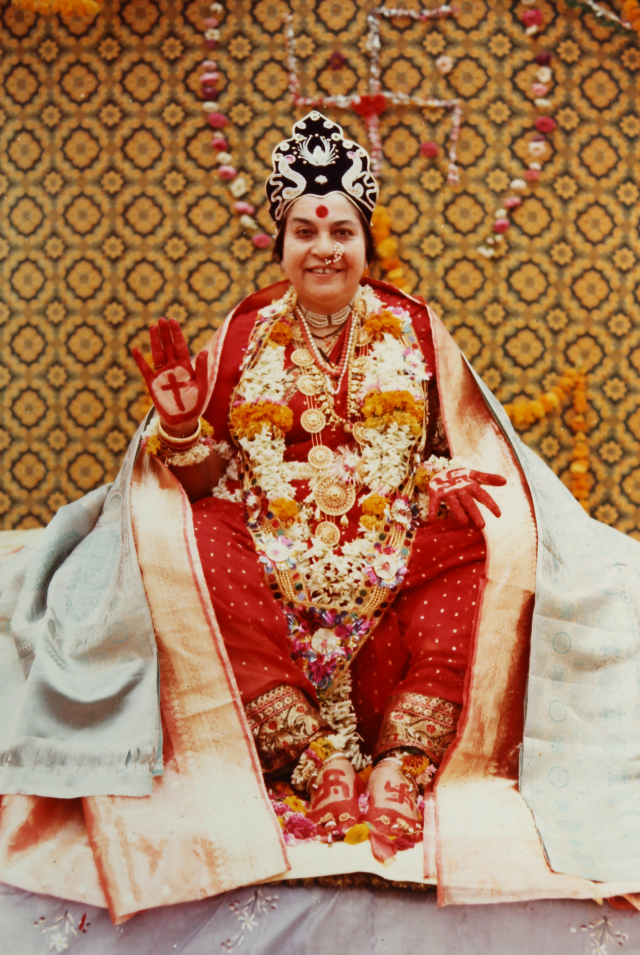
"The significance of Diwālī is spread out in about five days.
And they are all together somehow, these five days are all put together.
So they have different aspects, but in every aspect, there’s one common point is that the Goddess plays the main role."
1992-1025 Diwālī Pūjā (Diwālī Day), Sala Olimpia (Olympia Sports Hall), Timişoara, Romania
video
"Diwālī Pūjā is a very small Pūjā but extremely significant. Firstly in Diwālī, the first day they buy something for the family. You can – maybe some cooking utensil could be, an ornament for the wife or something like that. Because that is the day of housewife. And that day is to be celebrated as the housewife’s, I should say, homage to her. As a result you know in India even now housewives are very much respected. Actually they are respected all over."
1998-1025 Diwālī Pūjā (6th day after Diwālī Day), Expression of Love, Pal Sports Complex, Novi Ligure, Alessandria, Italy
"So inside every woman, there is a motherhood, there’s great capacities, sacrifice, everything is there. With that, they also should know they’re left-sided. And our joy about which we talk within our heart has to manifest outside.
People should see that we are joyous, that we are happy people, that we are not like others who start crying for small things.
So if you are a Sahaja Yoginī, then at the time of crisis you should become thoughtless. That’s one of the signs. I have seen with Myself, if there is any crisis in the family, I just become thoughtless. That means what? That God just takes you in your problems. He puts his hand, He puts His protection and He takes you out of it and makes you absolutely thoughtless. And in that thoughtless awareness, you discover what is right, what is wrong.
So even in crisis, this thoughtless awareness is all the time extremely alert. It becomes much more alert than normal. That’s the sign of a Sahaja Yogi and sign of Sahaja Yoginī."
1991-1110 Diwālī Pūjā (5th day after Diwālī Day), Joy and Happiness, Tent, Cabella Ligure, Alessandria, Italy
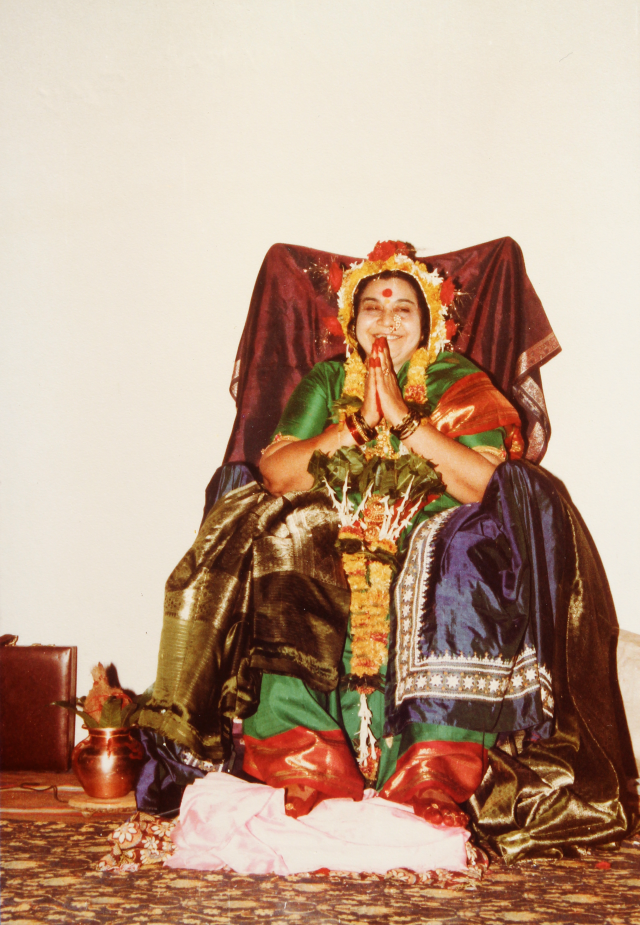
Shrī Mātājī: Aham Sākshāt Gṛuhalakṣhmī, Aham Sākshāt Gṛuhalakṣhmī, Aham Sākshāt Gṛuhalakṣhmī, Aham Sākshāt Gṛuhalakṣhmī, Aham Sākshāt Gṛuhalakṣhmī – ah!
1980-0313 Public Program, The Meaning of Sahaja Yoga, Caxton Hall, 10 Caxton Street, Westminster, London, UK
"Nothing is rigid. Rigidity comes from ignorance. It's all for you, for your joy and happiness. The whole festival system is for your happiness and not for the happiness of the time or date. It's for you, so it should be adjustable according to your needs and understanding. And also according to your national way you live. They should be no addiction to any particular type of culture, a particular type of ideas. It's all for you. All these festivals are for you, not for gods. They don't have these festivals. It's only for you people these festivals are there. And when you celebrate them, that's only for your joy and your happiness. And that's how you should celebrate in a way that gives you the greatest amount of happiness.
And the festivals, all the festivals of the world must be celebrated. The more you are festive, the happier it is. Why miss the chance, you see."
1981-1101 Diwālī Pūjā (5th day after Diwālī Day), The Mahālakṣhmī Powers and the Powers of Water, Āśhram, 44 Chelsham Road, London, Clapham, UK
"So the ladies of these place have to be good housewives, it’s very important. They have to be the Gṛuhalakṣhmīs. The one who is the Goddess of the household.
...... And Gṛuhalakṣhmī is a very powerful institution. In India, it is regarded as the highest, in a way. More than any prime minister or more than any highest position. The Gṛuhalakṣhmī’s position in the spirituality is regarded as the highest. Because, you see that it is said that a Satī, a Gṛuhalakṣhmī is higher than Yatis, Yatis is means are realized Souls of a very high level, Avadhūtas.
...... Women as in you know that we call them is the embodiment of śhaktis. But the Gṛuhalakṣhmī is the most powerful Śhakti. And She is the power of tremendous love, and compassion, and forgiveness."
1986-0921 Talk to Sahaja Yogis, The Role of Belgium and Holland, after the Śhrī Mahālakṣhmī Pūjā, Upper Room, House of Trees and Willy Maes, Maastrat, Mechelen (27 kms S of Antwerp), Belgium
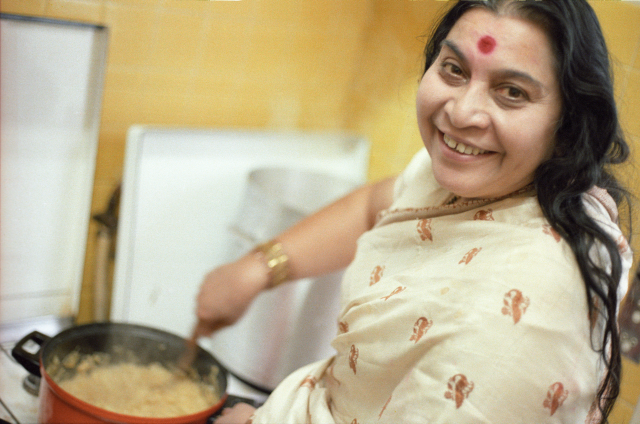
"Mahālakṣhmī is also Annapūrṇā.
And She, She supplies food – you see – to people.
You can say Mahālakṣhmī is the grandest Gṛuhalakṣhmī."
1984-0908 Śhrī Mary Mahālakṣhmī Pūjā, Münich, Germany
"Today we are going to have the Pūjā of Fāṭimah Bi, who was the symbol of Gṛuhalakṣhmī. And so we are going to have the Pūjā of the Gṛuhalakṣhmī Principle within us. As the housewife has to finish every work, everything in the household, and then she goes for a bath, in the same way this morning, I had to do lots of things and then I could come for your Pūjā. Because today the housewife’s jobs were many, so I had to finish them like a good housewife.
Now, the Principle of Gṛuhalakṣhmī has been evolved and developed by the Divine, it’s not a human being's creation. And as you know, it resides in the left Nābhī.
The Gṛuhalakṣhmī is the one that is represented in the life of Fāṭimah who was the daughter of Muhammad Sāhab. Now She is always born in a relationship to a Guru which is of virginity, of purity. So She comes as a sister or She comes as a daughter.
..While this Principle of the Gṛuhalakṣhmī was specially created to overcome that hatred, to subdue that icy stuff called hatred. To remove from the minds of the people [the] hatred, this Lakṣhmī ... Gṛuhalakṣhmī Principle was created. How? In the family when you have a household, the Gṛuhalakṣhmī Principle has to subdue the hatred between the children, between the husband and the children. But if she herself enjoys her hatred, then how can she subdue it? She is the source of that peace which subdues hatred."
1988-0814 Śhrī Fāṭimah Pūjā, Saint-George (40 kms W of Lausanne), Switzerland
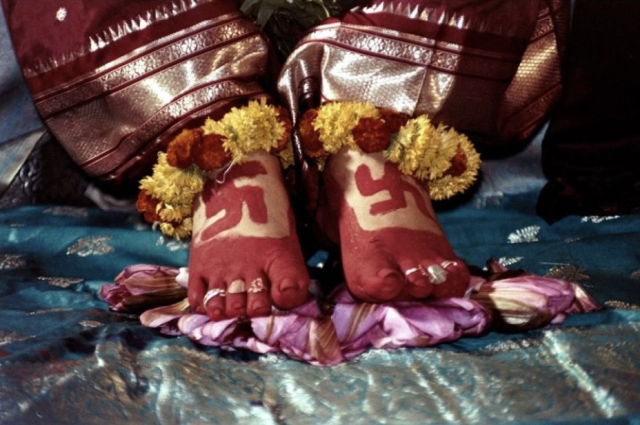
"So it is today we are here to enjoy our joy, our Ātmānanda, Nirānanda and Paramānanda.
All these we are here to enjoy, which are of eternal value.
You have to understand that now believe that you are in the Kingdom of God and all the subtle beauties of your being are going to be opened out to you.
You are going to see yourself all the beauty.
But here, if your eyes are already closed, if your heart is already closed and you don’t want to see something that’s so beautiful, how can I say what a beautiful thing they have made?
Is a very important thing in life, is to have a very positive attitude.
For Sahaja Yoga also. In Sahaja Yoga, we have to develop ourselves within."
1991-1110 Diwālī Pūjā (5th day after Diwālī Day), Joy and Happiness, Tent, Cabella Ligure, Alessandria, Italy
Auṃ Twameva sākṣhāt Śhrī Gṛuhalakṣhmī sākṣhāt Śhrī Ādi Śhakti Mātājī Śhrī Nirmalā Devī namo namaḥ!
O Divine Mother, You are verily the ideal housewife! Salutations to You!
Hasat Ali
video
Kanakadhara Stotram
video
Aṣhṭa Lakṣhmī Stotam by Pt. B Subramanian
video
Pavan Utsav ayya re
video
Lakṣhmī ʿAlī'
video
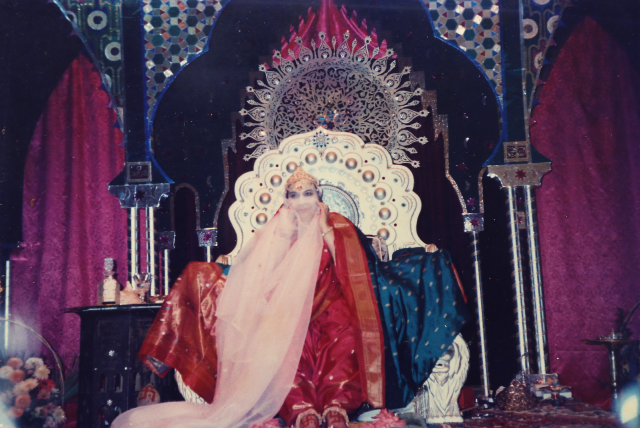
"The first day of Diwālī is called as ‘Dhanatrayodaśhī’, is the thirteenth day of the Moon.
Because that day is the first day when Lakṣhmī, the first ... was born on the thirteenth day.
That means She was born as a Gṛuhalakṣhmī, as a housewife. Now there are eight Lakṣhmīs, which she will read it now and I will tell you later on what is the meaning of them.
Just one of them is Gṛuhalakṣhmī.
So the first is the form of a Gṛuhalakṣhmī. She is born as a Gṛuhalakṣhmī to begin with.
That means the awareness of human beings also, started really getting into evolutionary process when they started their family life.
..So She is the first Lakṣhmī who was born, and that’s why on that thirteenth day is the day of the Gṛuhalakṣhmī, of the housewife.
And so one has to go in the market and buy some utensil or something that she uses for cooking in the house. In India on the thirteenth day, everyone goes and buys a pot or say ... we can say, what you call, a cooking utensil or something.
Or they may buy a sāṛī or something or gold or something for the gṛuhalakṣhmī. That is the day of the housewife.
So, to reach the Lakṣhmī one has to understand that motherhood is very important.
The motherhood as a gṛuhalakṣhmī is important."
1980-1109 Diwālī Pūjā (Bhāūbīj Day), The Mahālakṣhmī Power, Temple of All Faiths, Hampstead, London, UK
Wishing you all a very Happy Dhanteras and Happy Diwālī!
Jai Śhrī Mātājī!
On behalf of the festivity team!